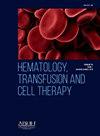Lack of association between the TMPRSS6 gene polymorphism (rs855791) and anemia: a comprehensive meta-analysis
IF 1.8
Q3 HEMATOLOGY
引用次数: 0
Abstract
Background
Anemia affects around 1.6 billion people worldwide and presents a significant challenge for healthcare providers. Despite the hemoglobin concentration being commonly used for diagnosis, identifying underlying causes remains challenging, particularly in vulnerable groups like children under five and pregnant women. Genetic factors, notably variations in the TMPRSS6 gene, are implicated in iron deficiency anemia, yet the precise relationship with anemia remains unclear.
Methods
A thorough literature search was conducted across databases, including Embase, Google Scholar, and PubMed, focusing on studies investigating TMPRSS6 gene polymorphisms and anemia. Thirteen eligible studies, comprising 2082 cases and 2684 controls, underwent meta-analysis using Review Manager 5.4 software. Various genetic models were assessed, including allelic, homozygous, heterozygous, dominant, and recessive, with no significant relationship found between the TMPRSS6 rs855791 polymorphism and anemia.
Conclusion
This meta-analysis provides robust evidence suggesting no significant association between the TMPRSS6 rs855791gene polymorphism and anemia. These findings underscore the complexity of genetic factors contributing to anemia and emphasize the importance of the further investigation to unravel the mechanisms underlying this relationship for improved diagnostic and therapeutic approaches.
TMPRSS6基因多态性(rs855791)与贫血缺乏相关性:一项综合荟萃分析
贫血影响全球约16亿人,对医疗保健提供者构成重大挑战。尽管血红蛋白浓度通常用于诊断,但确定潜在原因仍然具有挑战性,特别是在五岁以下儿童和孕妇等弱势群体中。遗传因素,特别是TMPRSS6基因的变异,与缺铁性贫血有关,但与贫血的确切关系尚不清楚。方法在Embase、谷歌Scholar和PubMed等数据库中进行全面的文献检索,重点研究TMPRSS6基因多态性与贫血的关系。13项符合条件的研究,包括2082例病例和2684例对照,使用Review Manager 5.4软件进行meta分析。对等位基因、纯合基因、杂合基因、显性基因和隐性基因等多种遗传模型进行了分析,均未发现TMPRSS6 rs855791多态性与贫血之间存在显著相关性。结论本荟萃分析提供了强有力的证据,表明TMPRSS6 rs855791基因多态性与贫血无显著相关性。这些发现强调了导致贫血的遗传因素的复杂性,并强调了进一步研究揭示这种关系背后的机制对改进诊断和治疗方法的重要性。
本文章由计算机程序翻译,如有差异,请以英文原文为准。
求助全文
约1分钟内获得全文
求助全文
来源期刊

Hematology, Transfusion and Cell Therapy
Multiple-
CiteScore
2.40
自引率
4.80%
发文量
1419
审稿时长
30 weeks
 求助内容:
求助内容: 应助结果提醒方式:
应助结果提醒方式:


